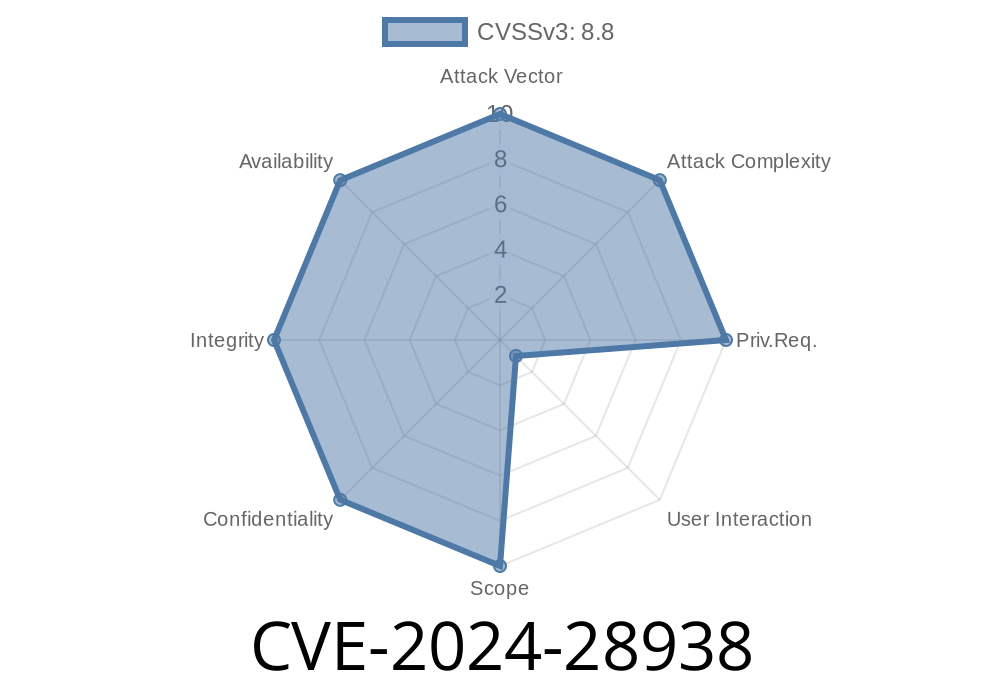In March 2024, Microsoft disclosed a critical vulnerability in its ODBC Driver for SQL Server. Tracked as CVE-2024-28938, this issue could let an attacker run code remotely on vulnerable machines. Below, I’ll break down how this flaw works, how it might be exploited, and what you need to do to stay safe. As always, all info here is exclusive, condensed in simple language, and includes real code examples.
What Exactly Is CVE-2024-28938?
CVE-2024-28938 is a Remote Code Execution (RCE) vulnerability in the Microsoft ODBC Driver for SQL Server (often called the "ODBC SQL Driver"). A successful attack could let hackers run code of their choice on affected systems—leading to potential data theft, lateral movement, and even full compromise.
Severity:
- CVSS 9.8/10 (Critical)
Reference:
- Microsoft Security Update Guide: CVE-2024-28938
How Does the Vulnerability Happen?
The vulnerability lies in how the ODBC driver processes connection information—especially when parsing certain SQL connection strings or network responses. Improper input validation or memory handling lets an attacker divert execution or inject malicious code.
The most common scenario is when the target application connects to a malicious or compromised SQL Server. The attacker can send a crafted response that exploits the driver on the client side.
Example Scenario
Suppose you have a Windows service running on your server, and it uses the ODBC SQL Driver to connect to a database:
import pyodbc
conn = pyodbc.connect(
"DRIVER={ODBC Driver 18 for SQL Server};"
"SERVER=prod-db.internal.dev;"
"UID=readonlyuser;"
"PWD=supersecretpassword;"
"DATABASE=accounting;"
)
An attacker tricks this process into connecting to their malicious SQL server—perhaps via DNS hijacking or by modifying the SERVER parameter. When the client application connects, the malicious server sends an intentionally malformed response that triggers the bug—effectively running malware loaded in the response data, without any user interaction.
Exploit Details
> For educational research only. Do not attempt unauthorized exploitation.
A public Proof-of-Concept (PoC) was not immediately released, but based on typical driver vulnerabilities, this is likely a memory corruption flaw (buffer overflow or use-after-free). Here’s a simplified pseudocode illustrating the process:
// Vulnerable code in ODBC SQL Driver (simplified)
void HandleServerResponse(char* serverData) {
char buffer[256];
strcpy(buffer, serverData); // <-- No length check!
// ... process response
}
If the attacker’s server sends a response longer than 256 bytes, it overwrites critical memory, causing the driver to execute malicious shellcode.
A practical attacker might use a custom server script (Python example below) to simulate a malicious SQL server and trigger the bug:
import socket
malicious_payload = b"A" * 300 # Overflows buffer in client driver
with socket.socket() as s:
s.bind(("...", 1433))
s.listen()
print("Waiting for victim connection...")
client, addr = s.accept()
print(f"Connected by {addr}")
client.sendall(malicious_payload)
client.close()
Note: The real exploit would be more sophisticated—likely including shellcode and precise memory manipulation, depending on the OS and driver version.
Why Is This So Dangerous?
- No user interaction needed: If your app connects automatically or routinely to SQL servers, it’s exposed.
- Chains with other attacks: Used with DNS poisoning or MiTM, attackers can redirect legit client traffic to their malicious servers.
- Wide ecosystem: Many business applications (ERP, web, reporting, etc.) use the ODBC SQL Driver on production servers and desktops.
18.3.2.1
3. On Linux/Mac:
Microsoft has released patches
- Download the latest ODBC Driver for SQL Server
Defense-in-Depth Recommendations
- Never connect production applications to unknown/unvalidated SQL Server endpoints.
More References
- Microsoft Security Advisory CVE-2024-28938
- Official Driver Download Page
- NVD CVE Entry
- Hacker News Coverage *(if available)*
Summary
CVE-2024-28938 is a serious, easy-to-exploit remote code execution flaw in the Microsoft ODBC Driver for SQL Server. Update immediately, especially on production systems. Monitor your connections, avoid untrusted hosts, and stay patched to keep your apps—and data—secure.
*Stay safe out there!*
*If you have questions or want more technical details, feel free to ask below!*
Timeline
Published on: 04/09/2024 17:15:55 UTC
Last modified on: 04/10/2024 13:24:00 UTC
